
In September 2023, the Publications Division of the American Chemical Society announced the introduction of an alternative pathway for publishing open access (OA) in hybrid ACS journals.
This new option complements a wide array of existing ACS OA publication pathways and is intended for authors who seek to publish zero-embargo green OA. We recognize most authors required to publish OA are already covered through institutional read and publish agreement or other funding sources.
Following the announcement, ACS Publications has received some questions regarding this novel approach and aims to provide further clarification below.
What costs are covered by the article development charge (ADC)?
The ADC covers all costs of publishing services leading up to the final editorial decision on a submitted manuscript. A large part of this cost relates to editorial and review activities performed by the Publications Division and represents a sizable financial investment from the American Chemical Society.
The price of the ADC is based upon the breakdown of those services which are provided from submission to final editorial decision to ensure the quality and integrity of the accepted manuscripts. These services include data verification and fraud detection, author support and community development, and maintaining and investing in the secure systems that support the myriad efforts by a vast global network of editors and reviewers that are required to maintain the high-quality scholarly peer review process.
Essentially, the ADC aligns with the standard practice of paying for services sought, valued, and received.

Is this a submission charge?
No. The ADC covers the costs associated with the services ACS Publications provides from submission to final editorial decision for the subset of authors who request zero-embargo green OA. Authors always have the no-cost option to have their manuscripts go through the peer review process and freely post their accepted manuscript with a 12-month embargo.
Does this option impact author rights?
No. This path does not impact author rights in any way.
The ADC covers the publishing services incurred in taking a manuscript from submission through to editorial decision making. Authors choosing this option can immediately post their accepted manuscript in a repository, enabling others to freely “distribute, remix, adapt and build upon” the work, including for commercial use.
Who is asking for or requiring zero-embargo green OA?
ACS Publications is hearing from authors who state they are required to make their accepted manuscript available immediately upon acceptance. This option is now available to them and any others wishing to pursue this OA route.
How does zero-embargo green OA publishing impact journal subscription rates?
The subscription rate for ACS journals is based on the usage of published articles. The significant usage of OA articles are specifically excluded from this calculation. When authors post editorially accepted manuscripts in OA repositories, the usage of the version of record on the ACS platform will be reduced, and the subscription calculations will reflect this.
There is no point at which ACS Publications charges for the same services twice.
Why is there a cost around managing submission and peer review?
Funders, institutions, and publishers alike acknowledge the need to cover the costs incurred to support high quality publishing activities. Managing the global operation of trusted scholarly communication requires continuous investment in people, systems, and support activities. This underpins the comprehensive process of broad integrity checks, rigorous peer review, engaging subject expertise, and a global effort from ACS Publications’ editors.
What’s the difference between gold OA and zero-embargo green OA?
Gold OA involves making the final published article (the 'version of record') immediately available online, with no charges for readers, upon payment of an APC.
Zero-embargo green OA involves posting the accepted manuscript in an institutional or subject repository immediate upon acceptance for publication in a journal upon payment of the ADC. But the final published article (the 'version of record') is available through subscription to the journal.
In both scenarios, ACS Publications produces the final version of record, but this new route will enable authors to bypass the embargo period and post the manuscript immediately once it’s accepted for publication.
What’s the difference between the ADC and an article publishing charge (APC)?
The ADC covers the costs associated with the services provided from submission to final editorial decision. Unlike an APC, the ADC does not cover expenses related to final production, digital distribution, discovery, and hosting of the version of record or maintaining post-publication updates.
The version of record remains the ‘gold star’ as it reflects the definitive and discoverable article; but this is an alternative for those authors who need immediate OA and aren’t covered by an institutional read and publish agreement.
Authors will never pay both an ADC and APC. Authors choosing gold OA after paying an ADC will pay only the difference in cost between the ADC and APC.
How will ACS support equitable access to this new OA option?
ACS Publications is determined to provide equitable pathways to OA publication. Researchers from all countries that currently receive special country pricing for APCs will also have waivers and discounts automatically applied for ADCs if they choose to pursue the zero-embargo green OA option.
Through inclusive pricing and the continuing pursuit of read and publish agreements, ACS Publications provides accessible OA publishing options for every author across the globe.
How does ACS Publications work to ensure scholarly integrity?
With the proliferation in paper mills and the potential chilling effect of artificial intelligence (AI) on data manipulation, the need to safeguard the integrity of research publications is paramount to ensuring credibility in the global scientific enterprise. ACS Publications continues to invest substantial resources to combat submitted manuscripts that violate community norms and undermine the integrity of scientific articles.
ACS Publications is also working with other publishers through the STM Association Integrity Hub and the Committee on Publication Ethics to stay abreast of rapidly evolving threats and explore how publishers can leverage sophisticated, state-of-the-art technology solutions to address these challenges.
What more can the community expect from ACS Publications’ support of OA?
Our vision for ACS Publications is to be the first choice of every researcher, whether they are an author, editor, reviewer, or reader. This driving force guides everything that we do at ACS.
The introduction of the zero-embargo green option is another step in ensuring that every author—regardless of their OA needs—has a place to publish within our family of high-quality journals. As the industry moves beyond being solely focused on a subscription-based model, ACS Publications is committed to finding sustainable, equitable, and creative ways to support all authors as they navigate funder and institutional mandates around public access.
ACS Publications continues to listen and discuss with authors, institutions, funders, and other partners in the global scholarly community as we work together to forge the path to a world with more trusted and freely accessible scientific research.